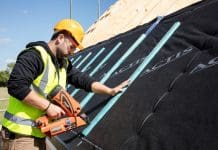The government should cut VAT on renovating buildings, in line with the VAT on new builds, to help revitalise the construction industry after Covid-19, says a new report by the Green Alliance
The report says the government should help accelerate the digitalisation of the industry to improve its performance and its environmental impact.
Productivity in the construction industry has not improved substantially for over 25 years and the sector is a long way behind other sectors in using new digital technologies.
The report highlights that upgrading and repurposing old buildings creates additional jobs in construction, while also helping to meet housing demand. It also significantly reduces the industry’s environmental impact.
New buildings benefit from zero rate VAT
20% VAT is levied on repair and renovation work. This discrepancy limits the renovation and upgrade of existing buildings for a net-zero future and encourages demolition and new build, which has a higher carbon and resource footprint.
The report states that “the UK has a legal requirement to create a net-zero carbon economy by 2050. 80% of the buildings that will exist in 2050 are already built.
“Bringing VAT for renovation in line with that for a new build is a necessary first step in upgrading more of the country’s existing building stock for low carbon living.”
By investing £300m in a new programme of whole house energy efficiency retrofits, the UK could scale up supply chains for digitally-enabled retrofits and deliver many more net-zero homes in one step.
Promoting digitally-enabled retrofits would also help to boost the construction sector’s low productivity levels and create more, highly skilled jobs across the country. Firms that use high tech, offsite manufacturing in this way have achieved up to 75% higher productivity compared to conventional construction methods.
Post-Covid support
Caterina Brandmayr, senior policy analyst at Green Alliance, said: “As the UK looks to build back better post-Covid, businesses should be investing in those smart low carbon supply chains that will be in high demand in the future and shield the sector from further disruptions down the line.
“To make this a reality, the government should start by removing the tax disincentives that are stopping the renovation and repair of existing buildings and scale up deep retrofit solutions that will create high skilled jobs across the country.”













